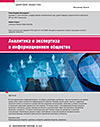Analytics and Expertise in the Information Society
The article deals with the following questions: what is common for analytics and expertise, how they differ and how they are related to each other; what are the characteristics of the information society. Analysis of the purposes, sense and content of the analysis and expertise processes in the target vector of managing organizations, projects in the context of technical and social revolutions of the modern era of changes is carried out. The model, structuring the basic processes of analytics and expertise, is constructed, the criteria of their coherence and delineation are indicated. Constructive definitions of analytics and expertise are given. A taxonomic map of the basic processes of expertise and analytics in the organization is built. Proposed solutions provide the necessary basis for developing methodological and regulatory materials for practical application of analytics and expertise.
References:
- Ryzhov V.A., Kurdyumov V.S. Umnye seti, mobil’nyy intellekt i strategicheskoe predvidenie [Smart Networks, Mobile Intelligence and Strategic Foresight]. Ekonomicheskie strategii, 2013, no 3.
- Lem S. Summa tekhnologii [Sum of Technology]. Moscow, Mir, 1968.
- Kun T. Struktura nauchnykh revolyutsiy [Structure of Scientific Revolutions]. Moscow, AST, 2003.
- Toffler E. Shok budushchego [Shock of the Future]. Moscow, AST, 2008.
- Toffler E., Toffler Kh. Revolyutsionnoe bogatstvo [Revolutionary Wealth]. Moscow, AST, 2007.
- Taleb N.N. Chernyy lebed’. Pod znakom nepredskazuemosti [Black Swan. In the Spirit of Unpredictability]. Moscow, KoLibri, 2009.
- Bard A., Zoderkvist Ya. Netokratiya. Novaya pravyashchaya elita i zhizn’ posle kapitalizma [Netocracy. New Ruling Elite and Life After Capitalism]. Saint Petersburg, Izdatel’stvo Stokgol’mskoy shkoly ekonomiki v Sankt-Peterburge, 2004.
- Stepin V.S. Teoreticheskoe znanie [Theoretical Knowledge]. Moscow, 2000.
- Al’tshuller G.S. Nayti ideyu. Vvedenie v TRIZ — teoriyu resheniya izobretatel’skikh zadach [Find an Idea. Introduction to TIPS — Theory of Inventive Problems Solving]. Moscow, Al’pina Pablisher, 2012.
- Kompleks “Saturn” — komponent umnoy i bystroy organizatsii [The Saturn Complex — Component of an Intelligent and Fast Organization], available at: http://www.xt-infomatics.com



